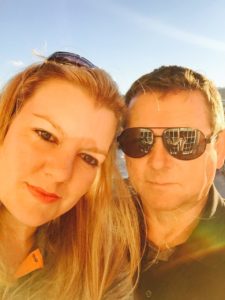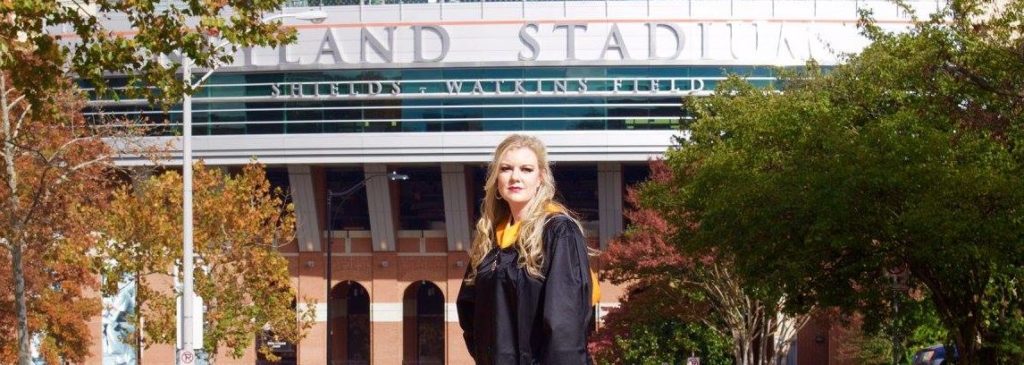
Adult Education
Cassandra earned an MS with the Adult Education program in 2017. She is originally from Atlanta, GA and currently lives in Knoxville, TN. We asked her to reflect on past experiences with EPC and discuss where she’s at now. Read her responses below.
Current Occupation
Accounting Specialist III
Office of the Bursar
University of Tennessee
Knoxville, TN
I currently work for the Bursar, Susan Forman, at UT Knoxville.
Accomplishments since Graduating
Greatest professional accomplishment since graduation has been the opportunity to work one-on-one with the Bursar to assist with daily duties of the position. I am beyond blessed to have a boss that completely supported me while I obtained my master’s. After finishing the program, I requested to learn more of the daily operations of the Bursar, and my boss has spent a great amount of time teaching me new programs, especially those in Banner. She continuously provides me opportunities to further my knowledge and enhance my career.
Personal Interests
 My husband and I enjoy traveling and when we have the opportunity on the weekends we like to engage in short excursions and enjoy local culture. My parents are very close to my husband, I have to admit that he is their favorite child, and quite often they come with us on our trips. This gives us all the opportunity to spend quality time together, including going to church together on Sundays.
My husband and I enjoy traveling and when we have the opportunity on the weekends we like to engage in short excursions and enjoy local culture. My parents are very close to my husband, I have to admit that he is their favorite child, and quite often they come with us on our trips. This gives us all the opportunity to spend quality time together, including going to church together on Sundays.
Accomplishments Earned as a Student
While conducting research for my final comps, I centered my topic on the transformative learning experiences of veteran students involved in combat. I have the upmost respect for the men and women who serve our country. My husband, father, uncle and great uncle are all Veterans. One of my greatest accomplishments was being able to interview a University of Tennessee veteran student that was an Army combat medic. To hear their experiences, how it related to their learning and helping others learn was one of the most rewarding experiences during my program.
What would you tell an incoming/current student?
Going into the program, my first thought was that I would come to know more about how adults learn so that it would help me create a successful learning environment in my position at the University of Tennessee. Teaching in the Atlanta Metropolitan School District gave me the experience to learn how culture and backgrounds influence learning, but only on a small scale. This program has introduced to me a worldly, holistic view of learning. Teaching at a public school system was just barely scraping the surface of what adult education would entail. After two years in the program, I have learned how the principles of adult education originated, how adult learning models and theories can facilitate learning, and how as individuals we can take all of our experiences and meanings and contribute to a successful learning environment both in and outside of the classroom.
The one thing that has remained constant is I have always viewed educators as individuals who love learning. This still remains true in higher adult education, but I have a new respect for adult educators. It is those in this field who love learning on a level that they have invested a great deal of time and research to help adult education learners. I realize that this program was never about changing the way we think because of curriculum, it was allowing us as individuals to be presented with new ideas, concepts, and experiences to help us facilitate our own learning. Everyone has a story, a journey, that has brought them to this program. We all have vast backgrounds, experiences, ideas, concepts, and thoughts that can contribute to learning. The key of this program was allowing us to come to our own understanding of what all of it meant for us individually.
How did your experiences as a student help you in your professional/personal life after graduation?
One learning experience that was particularly important to me was studying the movements in adult education in Cathy Hammon’s, clinical assistant professor, course “Survey of Adult Education”. It was interesting to see how adult education developed over time from the works of Socrates and Plato, to the modernist view of adult education. During my undergrad, I researched the Renaissance period due to its rich history of literature and art that resonated during that time. It was in Hammon’s course that I would learn the influence of that particular era on modern andragogy in practice. In humanistic adult education, what really stood out to me was one of the thought leaders; Martin Luther. As a Christian, my religion came from the Protestant Reformation initiated by Martin Luther. During my adolescent years, I learned about the Protestant Reformation but did not connect it to humanistic adult education. This was a very personal moment for me in the adult learning environment; to connect my religion to adult education. All of a sudden, I was able to connect something that is a very deep, personal belief for me to its importance in adult education.
Did you end up where you thought you would?
Currently at my position at the University of Tennessee, I have been putting into place the ideas and concepts that I have learned in this program. During Qi Sun’s, associate professor, course, “Facilitating Change in the Educational Environment”, we learned that we can take a look outside the box if we have a barrier in the educational environment to understand the reasons why an individual views change as positive or negative. By understanding how the individual views their experiences and how they have resonated with their critical reflection of their experience, we can facilitate a successful learning or workplace environment. On a daily basis, we come across individuals that seem to create a barrier in the workplace or learning environment. At first, it may seem easy to be discouraged. However, putting in place the concepts and ideas I have learned in this program helps me understand why others view certain aspects as positive or negative from their experiences.
“This program has a been a road; there were some smooth stretches, bumpy rides, some curves, some twists, some obstacles, but it was all leading to somewhere. A destination unlike any other, not a specific destination, but one that encompassed knowledge all along the path. It was not about where I was going, a specific mark; it was about the journey, about what I learned. This program was never about finding answers, it was about losing the questions and finding your own learning. One important aspect that I have learned in this program is that learning is life-long, it is a continuous journey. It does not stop because we reach a certain age or we graduate. All the lessons in life that are accumulated from the time of birth, are on-going and every experience contributes to our overall learning.”
